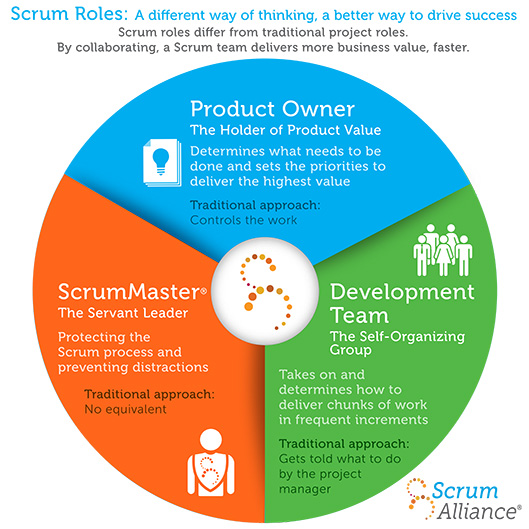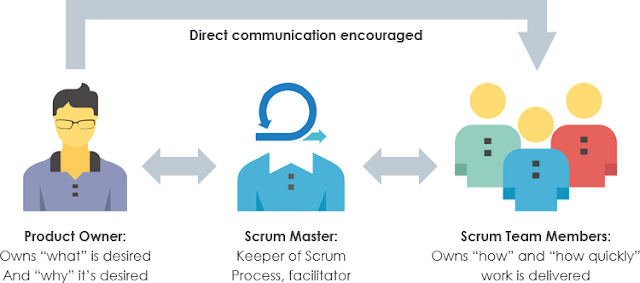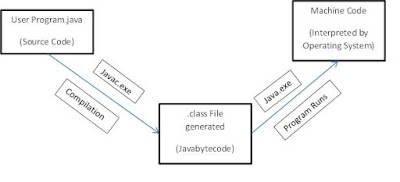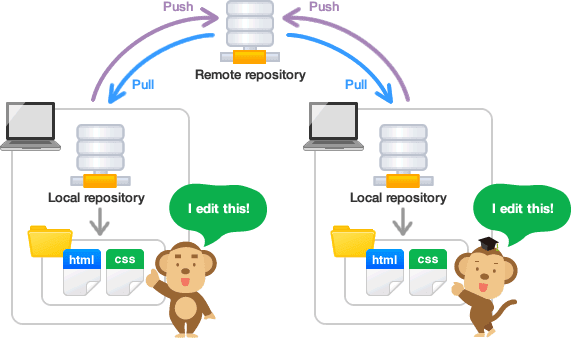Featured Post
Scrum Roles (Scrum Master, Product owner, Development Team) and collaboration between each other
- Get link
- X
- Other Apps
1.
What
is one service a Scrum Master provides to the Product Owner?
The Scrum Master is Scrum
Framework expert and responsible for its adherence in creating a successful
product. As an expert, he is the coach for both product owner and development
team. Now if we talk about service a Scrum Master provides to the
product owner - a product owner gets coaching from the Scrum Master especially
for:
•
In choosing the right product
management techniques and tools
•
In making product-related
decisions
•
In determining product management
practices.
2.
Who
can order the items in the Product Backlog?
As per Scrum Guide, - The Product backlog is an ordered list of everything that is known to be needed in the
product. It is the single source of requirements for any changes to be made to
the product. The Product Owner is responsible for the Product Backlog,
including its content, availability, and ordering.
The Product Owner owns the Product
Backlog, and he is the sole responsible person to take final call for any
decision-related to it. For the Product Backlog management, he mainly involves:
•
Clearly articulating and
communicating Product Backlog items.
•
Ordering Product Backlog items to
best achieve the product vision
•
Maximizing and optimizing
Development Team's work by clearly illustrating product vision
•
Ensuring that Product Backlog is
visible, clear, and transparent
• Make sure his availability to Development Team whenever they need him to understand Product Backlog items.
3.
What
is required when a Scrum Team says a Product Backlog item is “Done”?
Scrum Team includes three roles:
Scrum Master, Product Owner, and Development Team
For Definition of Done, all above
roles come together and collaborate to define it. Definition of Done represent
the shared understanding of the Scrum team as follows:
•
Development Team explores what
completion criteria’s are needed from the development point of view, Scrum
Master can facilitate to explore these criteria
•
Product Owner can communicate his
expectations for overall Product Backlog and/or for specific product backlog
items.
As per Scrum Guide, - At the
end of a Sprint, the new Increment must be “Done,” which means it must be in
useable condition and meet the Scrum Team’s definition of “Done.”
 |
| Scrum Roles |
4.
When
a Scrum Master encounters resistance from outside of the Development Team, what
should the Scrum Master do?
Scrum Master also serves the
organization in many ways:
•
Lead and coach in Scrum Framework
adoption
•
Plan effective ways to implement
Scrum within the organization
•
Helping Stakeholders for empirical
product development
•
Work with other Scrum Masters to
increase the effectiveness of the application of the Scrum in the organization
•
Work to improve transparency at
all levels of the organization’s Scrum Team’s work
When there is a resistance from
outside of the Development Team, in that case, the best way is to work with
other Scrum Master’s to understand that resistance and to improve the
effectiveness of Scrum.
Escalating the issue and not
intervening in the business are examples of withdrawing from the situation.
Also, status report is not a solution for a better future, as it does not
include action items to improve the situation.
5.
What
is one service a Scrum Master provides to the Development Team?
The Scrum Master is Scrum
Framework expert and responsible for its adherence in creating a successful
product. As an expert, he is the coach for both product owner and development
team. Now if we talk about service a Scrum Master provides to the
Development Team - a Development Team gets support from the Scrum Master
especially for:
•
In locating roadblocks
•
In removing those roadblocks
•
Facilitate the Development Team’s work
and improve communication
•
Explore areas of improvement and
suggest changes.
•
As per Scrum Guide, – The Scrum
Master serves the Development Team in several ways, including:
•
Coaching the Development Team in
self-organization and cross-functionality;
•
Helping the Development Team to
create high-value products;
•
Removing impediments to the
Development Team’s progress;
•
Facilitating Scrum events as
requested or needed; and,
•
Coaching the Development Team in
organizational environments in which Scrum is not yet fully adopted and
understood.
 |
Scrum Roles Duties |




Comments
Post a Comment
Let's discuss and learn more